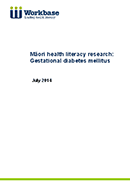
Health Literacy generally refers to the degree to which people are able to access and understand essential health information in order to make informed and appropriate health decisions. Research has shown there is a strong relationship between a person’s health literacy and their health status.
The report focuses on the experiences among young pregnant Māori women in relation to gestational diabetes mellitus (GDM), a type of diabetes some women get during pregnancy. While the condition usually goes away after delivery, it is a precursor to type 2 diabetes. GDM is also associated with a risk of complications during pregnancy, labour and after childbirth.
GDM can be identified only during pregnancy and the general two-step screening approach can be complicated. Health practitioner communication is important in helping pregnant women understand the screening process and make an informed decision. There is low uptake of screening by Māori women, despite their fairly high risk of developing GDM.
The report identifies health literacy barriers in understanding and managing GDM. The report also highlights interventions that may strengthen health literacy to allow better understanding of GDM and greater uptake of screening for GDM by pregnant Māori women.
